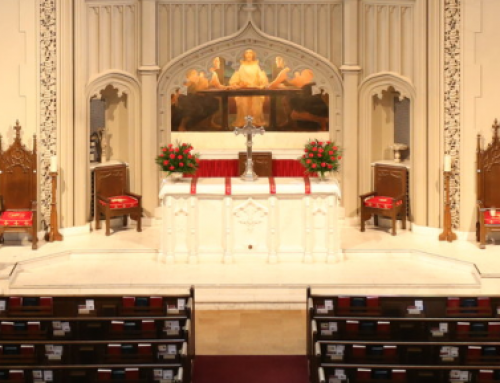Yesterday a Facebook friend of mine shared his letter to the editor, as published in a national newspaper. I quote, “From the beginning of the corona crisis I miss our [physical] church services. I have kept hanging on to the image – call it a vision – of an entire congregation returning to church after all the nastiness is over. I dreamt of a service which was not meant to end, in which we would sing praises, celebrate Holy Communion, be overcome by sorrow for those who had been taken away from us in the meantime, and in which we could not hug each other enough. That will not happen just yet. And now our PKN [Dutch national church; ed.] is going to tamper with the number of people that should be admitted and with the 1,5 meter social distancing. No singing. Baptisms using a bowl on a stick. No social gathering afterwards? Someone counting those who may enter? Sending the others back? They will not find me there” (Trouw, May 15, 2020).
I happened to know that he himself had lost someone close to him, so I can imagine that neither an online service, nor a stripped down physical church service would come close to what was needed. But even for the average church going person, the protracted changes to our weekly routine are making for a shock to the system which should not be underestimated. Especially since the return to normal will not be easy and even, in a way, impossible.
At this point, those who are philosophically inclined – of which there are many in church – will have a reflex which is difficult to suppress. They will say that maybe we are not meant to return to normal. I have already seen long lists of lessons we can draw from this corona crisis. All reasons why our society – and that includes the church – cannot and should not return to normal, because we live in a rapidly changing world and this requires a “new normal”. For various reasons beyond the scope of this article, gouvernments and media have also embraced and are pushing this concept of the “new normal”.
But what interested me about those lists of lessons, was that they were basically quick and easy ways to find meaning in a new and threatening situation (and to a certain extent also imposing such interpretations). It seems to be a very human tendency. An example. As you may know, singing in church is currently suspected of being one of the “best” ways to spread the virus. So someone quickly came up with the idea to replace it by silence. There was not enough silence in most services, anyway. However, if we are normally not inclined to have periods of silence, how is it going to work when we have to be silent and can’t sing?
I was also reminded of a similar quick fix by a theologian, who wanted us to regard the lock-down, among other things, as a kind of fast from holy communion. One of the problems with that interpretation was that, nowadays, a fast is usually something voluntary, whereas this “fast” from holy communion was not. The person who came up with this “solution” or “meaning” was lucky that we were in Lent at the time, which had associations with fasting, anyway. Since Easter has come and gone, we don’t hear much about this theological twist anymore.
Most Christians, especially outside the USA, have learnt to be careful with claims that catastrophes like Covid-19 are punishments sent by God. Such claims are not only too easy, but often perfectly fit into a particular agenda, for instance opposition against the rise of LGBT-rights. However, milder lessons we may wish to discern in this pandemic may just as well emerge from a particular agenda and be not entirely in the interest of the public, in this case the man and woman (who used to be) in the pew.
In the case of not singing, this might suit the person who doesn’t like the praise songs or the traditional hymns, anyway, or who prefers silent retreats. Silence is also the easiest thing to organise. But this is the least of my concerns.
In the case of the “fast from holy communion”, I strongly suspect one of the motives was to prevent people from organizing a service of holy communion at home, without explicitly having to address the reasons why this would not be acceptable. In this way, even the practice of some churches in the Netherlands to share bread and wine at home, with an ordained minister supervising the service online, could be discouraged without any discussions about the real issues.
In the case of all kinds of strict measures in reopened churches, there could well be similar, understandable, but nevertheless unspoken and troublesome agendas. Especially in the light of all the scandals that have taken place in the church, and earlier outbreaks of the virus in church settings, we are consciously or subconsciously trying to show to the world that we are a very responsible people, preferably even more responsible and strict than what the gouvernment requires. I think it’s called being more Catholic than the Pope. And while this may all help to reduce risks and protect our vulnerable, often elderly people, we may be less aware of the impact of all these good looking technical measures on people’s minds and spiritual well-being.
Paradoxically, the more we reduce risks by our words and actions, the more these risks will be noticed and lead to fear, which is the very thing we normally try to take away by preaching the gospel. Could it be that by taking all these measures we are trying to avoid speaking about the meaning of difficult texts like Psalm 91:7? “A thousand shall fall at thy side, and ten thousand at thy right hand; but it shall not come nigh thee”. I have not heard one sermon about this, and I have listened to many. Most preachers neatly kept to the prescribed readings in the lectionary.
Another problem is that these technical measures are often top-down. There is neither sufficient opportunity nor expertise nor, perhaps, inclination to involve the whole community in a democratic way. This leads, justified or not, to a heightened perception of the church as something hierarchical. People hardly recognize their own church anymore. They may be thankful the church continues, and they may still be involved, but no longer in the same way. When they return physically, or even think about returning, they are bound to be insecure as to whether and how they will fit in.
The fact that a small core group has been doing all the work and has taken all the decisions, is great, but also has an alienating effect. Many people will no longer be used to active participation. This effect is amplified by some priests and ministers still celebrating a kind of Eucharist without the normal distribution. Even some auxiliary clergy and lay ministers are now standing on the side lines of the liturgical practices of the church.
Which brings me to another platitude that can be found all over the place. “The church is not empty. It has been deployed!” An article of the Berean Bible Church explains how prayer for healing is needed more than ever. However, it leaves unanswered why this would not have been possible inside as well as outside church buildings. It begs the question why this kind of deployment (actually more a limitation) was supposedly never before in our lifetime, necessary. You see, it suggests meaning and intentionality, but it doesn’t deliver. And it has the additional difficulty of making you wonder if we can do without the traditional church indefinitely.
All this is not meant as criticism, but to underline that any lessons to be drawn from this crisis are probably incomplete, premature and often incorrect. Although the Church is in the business of providing meaning, it is equally important to let people have their own journey through this wilderness. We may want to put this wilderness full of signposts, but it will remain a wilderness to all. Such a place has advantages. Lessons can be learnt. But the good thing is that they will have to be our own lessons. The way someone else, even a religious leader, experiences this time, will no longer always help.
I used to frown when, after the smallest reorganization, people said they didn’t recognize “their” church anymore. After all, no single person owns a church. Changes are inevitable. But is equally important that changes, if any, are honestly for the benefit of the community as a whole. Some changes do not change anything but just preserve the status quo or try to eliminate the need for real change. Or they are just for the outside world to see how ethical we are.
Times of trouble often highlight existing problems. These will be different for everyone. And that, paradoxically, is what we all have in common. This means that respect for the individual and his or her personal situation and perception, should be paramount. During our recent National Remembrance Day, Arnon Grunberg reminded us to regard each other as individuals, not as members or representatives of some group. I would add that we are social beings, but we somehow even manage to use being social to discriminate.
It calls for a Church which is more egalitarian, less compulsively prescriptive, less into instant solutions and explanations. It calls for a priesthood of all believers. In desert episodes there is little distinction between priests and lay people, leaders and flock, the lost and the elect. Alone with our trials and our God, a better world still awaits, but not necessarily through or after Covid-19. If I am right, this is not about a new lesson we can draw from our current predicament, but about an old one. And it has a way of resurfacing until we fully surrender to what is good for humanity in the long term, the Kingdom of God which is never far away.




Leave A Comment